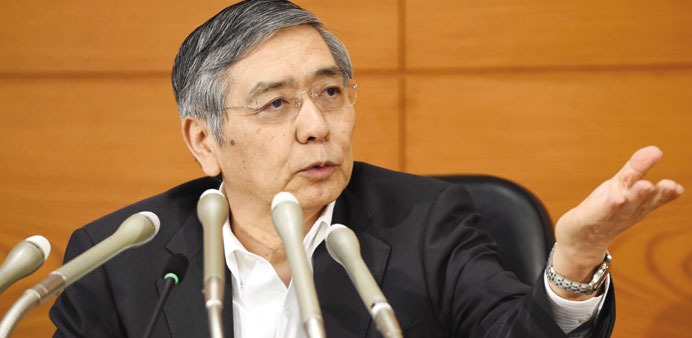Kuroda: Economy is out of the doldrums.
Reuters/Tokyo
The Bank of Japan offered a slightly more upbeat view of the economy yesterday and its governor shrugged off the need for more monetary stimulus, dismissing market concerns that the recovery is too slow to accelerate inflation toward the bank’s target.
Signalling its confidence the world’s third-largest economy is out of the doldrums, the central bank revised up its assessment on private consumption and housing investment – areas hardest hit by last year’s sales tax hike.
Underscoring the optimism, a Reuters poll showed retailers’ mood turned positive in May and hit the highest level since June last year, when sales were reeling after the tax increase.
That followed data on Wednesday which showed Japan’s economy expanded at the fastest pace in a year in January-March due to modest increases in private consumption, which makes up roughly 60% of GDP.
Governor Haruhiko Kuroda said consumption is set to increase as wages rise, keeping Japan on path to hit the BoJ’s 2% inflation target around the six months to September 2016.
“Both for households and companies, a positive cycle is kicking in,” where increases in income are leading to higher spending, he told reporters after the meeting.
“We expect trend inflation to improve steadily, so we’re not thinking about additional monetary easing now.”
Kuroda reminded markets, however, that the BoJ was ready to expand stimulus again if the economy falters and threatens to disrupt the broad uptrend in inflation.
As widely expected, the BoJ maintained its pledge of increasing base money at an annual pace of ¥80tn ($662bn) through aggressive asset purchases. “Japan’s economy continues to recover moderately,” the central bank said, a slightly more optimistic tone than last month when it said the economy was recovering moderately “as a trend.”
Consumption is firm and housing investment is bottoming out with some signs of a pick-up, the BoJ said, offering a brighter view than last month.
Some analysts, however, were puzzled with the BoJ’s optimism given the modest pace of recovery, particularly in consumption.
“If you look at the data, the trend for the economy has not improved as much as the BoJ’s upgrades would suggest, so I find this move a little hard to understand,” said Shuji Tonouchi, senior fixed income strategist at Mitsubishi UFJ Morgan Stanley Securities.
“We still expect the debate about additional easing to heat up again this autumn, because consumer prices are not likely to rise as fast as the BoJ expects.”
Barclays Capital also expected the BoJ would have to ease policy again, although following Kuroda’s comments it pushed back its forecast for the timing of such a move from July to April 2016.
The Reuters Tankan, which closely tracks the BoJ’s quarterly tankan survey, showed yesterday that manufacturers are more upbeat about business and expect conditions to improve further.
An index measuring service-sector sentiment rose to the highest level since April last year.
The BoJ bought itself some breathing space last month when it pushed back the timing for hitting its inflation target. But the move also put its credibility on the line as it jarred with its commitment to achieve the price target in “roughly two years” since deploying the stimulus in April 2013.
Kuroda has voiced confidence the stimulus was succeeding in keeping the economy on track to hit the price target. But markets are unconvinced, with a majority of analysts in a Reuters poll betting on further easing in October. Japan’s net external assets rose to a record ¥366.86tn ($3.03tn) at the end of last year as a weak yen boosted the value of overseas holdings, making the country the world’s biggest creditor nation for 24 years in a row, the finance ministry said yesterday.
The value of net assets held by the Japanese government, businesses and individuals exceeded the previous year’s ¥325tn, the biggest amount on comparable data, ministry officials said.
Japan’s net external assets were 1.7 times those held by China, the world’s No.2 creditor nation with ¥214.3tn in net assets at the end of 2014, followed by Germany whose assets stood at ¥154.7tn, the ministry said.
Japan’s gross external assets rose 18.5% to ¥945.27tn, up for a sixth consecutive year, as the weak yen boosted the appraised value of external assets by ¥64tn from the year before, the ministry said.
External debt also grew 22.6% to ¥578.42tn, up for a fifth straight year, helped by increased acquisitions by foreign investors of Japanese equities and other assets.
The Bank of Japan’s aggressive monetary stimulus has helped drive down the yen, boosting exporters’ profits and share prices.
The dollar traded at 119.80 yen at the end of 2014, up 13.7% from the year before, and the euro largely held steady at 145.44 yen, the finance ministry said.

